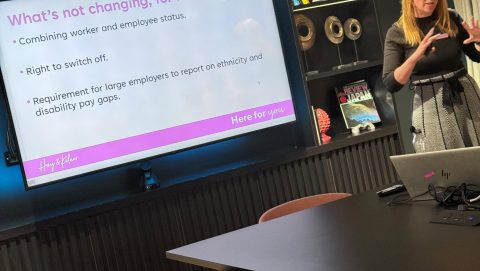
Organisations have been urged to keep an “open dialogue” with their staff and respect their concerns about returning to the office after the government announced the remaining coronavirus rules in England will end later this week.
Boris Johnson announced yesterday that all legal restrictions on Covid will come to an end in England on Thursday (24 February), meaning that individuals who test positive for Covid-19 will no longer be legally required to self-isolate.
Individuals who test positive will, for now, still be advised to stay at home for at least five days. However, from 1 April that guidance will also end and instead people with Covid symptoms will be asked to “exercise personal responsibility”.
As part of his ‘Living with Covid’ plan, the prime minister also announced an end to several support packages that were put in place to help individuals self isolate.
The £500 payment for those on low incomes who test positive for Covid-19 will be scrapped from Thursday, along with routine contact tracing, and workers will no longer be required to tell their employers if they have to self-isolate.
From 24 March, employees with Covid will also no longer be eligible for statutory sick pay (SSP) from day-one of their illness – with SSP only being paid on the fourth consecutive day of illness.
And the government will no longer provide universal free testing in England from 1 April. From this date employers will also no longer have to explicitly consider Covid in their risk assessments.
Currently no changes have been announced for the devolved nations.
Commenting on the changes, Peter Cheese, chief executive of the CIPD, encouraged employers to remain cautious and consider their duty of care going forward.
Recognising that there will be sectoral differences in the way businesses approach the change, Cheese said that in all cases it would “be important to continue an open dialogue with employees”.
“When deciding what rules and guidance to put in place, employers need to be led by the principles of what is fair and reasonable to ask, respecting that many people with vulnerabilities will still be very concerned about coming into places of work,” he said.
Cheese added that firms should continue existing practices to keep workplaces safe, including maintaining good ventilation, cleaning and sanitation.
However, employers have also been warned to consider carefully what Covid-related policies they want to continue to enforce going forward.
While many firms will want to continue to ask individuals with Covid to stay at home after the guidance changes, Alan Price, CEO of BrightHR, cautioned: “Businesses will need a sound business case to explain very clearly why a Covid isolation policy is needed, [for example] to protect vulnerable staff or clients.”
Employers will also need to decide whether they want to make testing a requirement going forward – and if so, whether they will provide testing kits to staff – and consider how the changing rules around SSP might affect their business, said Price.
While the end of the extended SSP scheme for individuals who test positive for Covid could mean lower costs for employers, the end of the SSP Rebate Scheme for smaller employers will also mean some firms will see their SSP bill go up, he said.
Samantha Dickinson, partner at Mayo Wyne Baxter, urged employers not to see yesterday’s announcement as a “green light” to bring all employees back to the office, warning that any blanket policies could likely lead to tribunal claims.
“A prudent employer will carry out a risk assessment of its offices to identify any specific risk to infection and transmission in that workspace and then take steps to reduce those risks,” she said, adding that employers should also consult with individuals reluctant to return to the office.
Claire Walker, co-executive director of the British Chambers of Commerce, said the prime minister’s plan “inches us closer to pre-pandemic trading conditions”. But, she also warned that free workplace testing was a crucial measure for companies during the pandemic.
“If the government is to remove this, companies must still be able to access tests on a cost-effective basis,” she said.
Walker added that firms would “only truly be able to live with Covid when they are confident that a plan is in place for future outbreaks… Uncertainty will put a brake on investment and the shadow of the pandemic could continue to loom over our economy for some time to come.”
Source – https://www.peoplemanagement.co.uk/





















